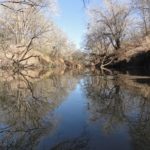Navasota River watershed protection plan accepted by EPA
Contact: Dr. Lucas Gregory, 979-845-7869, [email protected]
Dr. John Tracy, 979-862-7221, [email protected]
COLLEGE STATION – The U.S. Environmental Protection Agency recently accepted the Navasota River Watershed Protection Plan, developed by the Texas Water Resources Institute and the Navasota River Watershed Partnership.
The plan was accepted as a result of its meeting the agency’s national guidelines for watershed-based plans and effectively outlining a strategy to improve the watershed’s water body segments impaired by bacteria and depressed dissolved oxygen, said the plan’s developers.
“This acceptance comes after extensive collaboration between local watershed landowners and stakeholders, including business and industry representatives, agricultural producers, city and county personnel, local soil and water conservation districts, and more,” said Dr. Lucas Gregory, Texas Water Resources Institute research scientist in College Station. “Local education and outreach formed the basis of this planning effort.
“During plan development, we worked with stakeholders to identify, evaluate and quantify impairment causes and sources, thus allowing them to make informed decisions regarding management recommendations to mitigate source contributions in a cost-effective manner.”
The Navasota River watershed below Lake Limestone is in East-Central Texas and encompasses approximately 1,570 square miles and more than 1 million acres.
“We are pleased with EPA’s acceptance of the plan,” said John Tracy, the institute’s director. “The plan sets forth an approach to improve resource stewardship that allows stakeholders to rely on watershed resources for their livelihood while also helping to restore the quality of its water resources.”
The watershed plan is currently available for download at https://twri.tamu.edu/media/1446/tr-497.pdf.
Development of the plan was funded through a state nonpoint source grant to the Texas Water Resources Institute from the Texas State Soil and Water Conservation Board. The institute is part of Texas A&M AgriLife Research, the Texas A&M AgriLife Extension Service and the College of Agriculture and Life Sciences at Texas A&M University.



